- Home
- George Orwell
Coming Up for Air Page 10
Coming Up for Air Read online
Page 10
Father had already spoken to old Grimmett, the grocer, who wanted a smart lad and was willing to take me into the shop immediately. Meanwhile Father was going to get rid of the errand-boy, and Joe was to come home and help with the shop till he got a regular job. Joe had left school some time back and had been more or less loafing ever since. Father had sometimes talked of 'getting him into' the accounts department at the brewery, and earlier had even had thoughts of making him into an auctioneer. Both were completely hopeless because Joe, at seventeen, wrote a hand like a ploughboy and couldn't repeat the multiplication table. At present he was supposed to be 'learning the trade' at a big bicycle shop on the outskirts of Walton. Tinkering with bicycles suited Joe, who, like most halfwits, had a slight mechanical turn, but he was quite incapable of working steadily and spent all his time loafing about in greasy overalls, smoking Woodbines, getting into fights, drinking (he'd started that already), getting 'talked of' with one girl after another and sticking Father for money. Father was worried, puzzled and vaguely resentful. I can see him yet, with the meal on his bald head, and the bit of grey hair over his ears, and his spectacles and his grey moustache. He couldn't understand what was happening to him. For years his profits had gone up, slowly and steadily, ten pounds this year, twenty pounds that year, and now suddenly they'd gone down with a bump. He couldn't understand it. He'd inherited the business from his father, he'd done an honest trade, worked hard, sold sound goods, swindled nobody-and his profits were going down. He said a number of times, between sucking at his teeth to get the crumb out, that times were very bad, trade seemed very slack, he couldn't think what had come over people, it wasn't as if the horses didn't have to eat. Perhaps it was these here motors, he decided finally. 'Nasty smelly things!' Mother put in. She was a little worried, and knew that she ought to be more so. Once or twice while Father was talking there was a far-away look in her eyes and I could see her lips moving. She was trying to decide whether it should be a round of beef and carrots tomorrow or another leg of mutton. Except when there was something in her own line that needed foresight, such as buying linen or saucepans, she wasn't really capable of thinking beyond tomorrow's meals. The shop was giving trouble and Father was worried-that was about as far as she saw into it. None of us had any grasp of what was happening. Father had had a bad year and lost money, but was he really frightened by the future? I don't think so. This was 1909, remember. He didn't know what was happening to him, he wasn't capable of foreseeing that these Sarazin people would systematically undersell him, ruin him and eat him up. How could he? Things hadn't happened like that when he was a young man. All he knew was that times were bad, trade was very 'slack', very 'slow' (he kept repeating these phrases), but probably things would 'look up presently'.
It would be nice if I could tell you that I was a great help to my father in his time of trouble, suddenly proved myself a man and developed qualities which no one had suspected in me-and so on and so forth, like the stuff you used to read in the uplift novels of thirty years ago. Or alternatively I'd like to be able to record that I bitterly resented having to leave school, my eager young mind, yearning for knowledge and refinement, recoiled from the soulless mechanical job into which they were thrusting me-and so on and so forth, like the stuffy you read in the uplift novels today. Both would be complete bunkum. The truth is that I was pleased and excited at the idea of going to work, especially when I grasped that old Grimmett was going to pay me real wages, twelve shillings a week, of which I could keep four for myself. The big carp at Binfield House, which had filled my mind for three days past, faded right out of it. I'd no objection to leaving school a few terms early. It generally happened the same way with boys at our school. A boy was always 'going to' go to Reading University, or study to be an engineer, or 'go into business' in London, or run away to sea-and then suddenly, at two days' notice, he'd disappear from school, and a fortnight later you'd meet him on a bicycle, delivering vegetables. Within five minutes of Father telling me that I should have to leave school I was wondering about the new suit I should wear to go to work in. I instantly started demanding a 'grown-up suit', with a kind of coat that was fashionable at that time, a 'cutaway', I think it was called. Of course both Mother and Father were scandalised and said they'd 'never heard of such a thing'. For some reason that I've never fully fathomed, parents in those days always tried to prevent their children wearing grown-up clothes as long as possible. In every family there was a stand-up fight before a boy had his first tall collars or a girl put her hair up.
So the conversation veered away from Father's business troubles and degenerated into a long, nagging kind of argument, with Father gradually getting angry and repeating over and over-dropping an aitch now and again, as he was apt to do when he got angry-'Well, you can't 'ave it. Make up your mind to that-you can't 'ave it'. So I didn't have my 'cutaway', but went to work for the first time in a ready-made black suit and a broad collar in which I looked an overgrown lout. Any distress I felt over the whole business really arose from that. Joe was even more selfish about it. He was furious at having to leave the bicycle shop, and for the short time that he remained at home he merely loafed about, made a nuisance of himself and was no help to Father whatever.
I worked in old Grimmett's shop for nearly six years. Grimmett was a fine, upstanding, white-whiskered old chap, like a rather stouter version of Uncle Ezekiel, and like Uncle Ezekiel a good Liberal. But he was less of a firebrand and more respected in the town. He'd trimmed his sails during the Boer War, he was a bitter enemy of trade unions and once sacked an assistant for possessing a photograph of Keir Hardie, and he was 'chapel'-in fact he was a big noise, literally, in the Baptist Chapel, known locally as the Tin Tab-whereas my family were 'church' and Uncle Ezekiel was an infidel at that. Old Grimmett was a town councillor and an official of the local Liberal Party. With his white whiskers, his canting talk about liberty of conscience and the Grand Old Man, his thumping bank balance and the extempore prayers you could sometimes hear him letting loose when you passed the Tin Tab, he was a little like the legendary Nonconformist grocer in the story-you've heard it, I expect:
'James!'
'Yessir!'
'Have you sanded the sugar?'
'Yessir!'
'Have you watered the treacle?'
'Yessir!'
'Then come up to prayers.'
God knows how often I heard that story whispered in the shop. We did actually start the day with a prayer before we put up the shutters. Not that old Grimmett sanded the sugar. He knew that that doesn't pay. But he was a sharp man in business, he did all the high-class grocery trade of Lower Binfield and the country round, and he had three assistants in the shop besides the errand-boy, the van-man and his own daughter (he was a widower) who acted as cashier. I was the errand-boy for my first six months. Then one of the assistants left to 'set up' in Reading and I moved into the shop and wore my first white apron. I learned to tie a parcel, pack a bag of currants, grind coffee, work the bacon-slicer, carve ham, put an edge on a knife, sweep the floor, dust eggs without breaking them, pass off an inferior article as a good one, clean a window, judge a pound of cheese by eye, open a packing-case, whack a slab of butter into shape and-what was a good deal the hardest-remember where the stock was kept. I haven't such detailed memories of grocering as I have of fishing, but I remember a good deal. To this day I know the trick of snapping a bit of string in my fingers. If you put me in front of a bacon-slicer I could work it better than I can a typewriter. I could spin you some pretty fair technicalities about grades of China tea and what margarine is made of and the average weight of eggs and the price of paper bags per thousand.
Well, for more than five years that was me-an alert young chap with a round, pink, snubby kind of face and butter-coloured hair (no longer cut short but carefully greased and slicked back in what people used to call a 'smarm'), hustling about behind the counter in a white apron with a pencil behind my ear, tying up bags of coffee like lightning and jockeying th
e customer along with 'Yes, ma'am! Certainly, ma'am! And the next order, ma'am!' in a voice with just a trace of a Cockney accent. Old Grimmett worked us pretty hard, it was an eleven-hour day except on Thursdays and Sundays, and Christmas week was a nightmare. Yet it's a good time to look back on. Don't think that I had no ambitions. I knew I wasn't going to remain a grocer's assistant for ever, I was merely 'learning the trade'. Some time, somehow or other, there'd be enough money for me to 'set up' on my own. That was how people felt in those days. This was before the war, remember, and before the slumps and before the dole. The world was big enough for everyone. Anyone could 'set up in trade', there was always room for another shop. And time was slipping on. 1909, 1910, 1911. King Edward died and the papers came out with a black border round the edge. Two cinemas opened in Walton. The cars got commoner on the roads and cross-country motor-buses began to run. An aeroplane-a flimsy, rickety-looking thing with a chap sitting in the middle on a kind of chair-flew over Lower Binfield and the whole town rushed out of their houses to yell at it. People began to say rather vaguely that this here German Emperor was getting too big for his boots and 'it' (meaning war with Germany) was 'coming some time'. My wages went gradually up, until finally, just before the war, they were twenty-eight shillings a week. I paid Mother ten shillings a week for my board, and later, when times got worse, fifteen shillings, and even that left me feeling richer than I've felt since. I grew another inch, my moustache began to sprout, I wore button boots and collars three inches high. In church on Sundays, in my natty dark-grey suit, with my bowler hat and black dogskin gloves on the pew beside me, I looked the perfect gent, so that Mother could hardly contain her pride in me. In between work and 'walking out' on Thursdays, and thinking about clothes and girls, I had fits of ambition and saw myself developing into a Big Business Man like Lever or William Whiteley. Between sixteen and eighteen I made serious efforts to 'improve my mind' and train myself for a business career. I cured myself of dropping aitches and got rid of most of my Cockney accent. (In the Thames Valley the country accents were going out. Except for the farm lads, nearly everyone who was born later than 1890 talked Cockney.) I did a correspondence course with Littleburns' Commercial Academy, learnt book-keeping and business English, read solemnly through a book of frightful blah called The Art of Salesmanship, and improved my arithmetic and even my handwriting. When I was as old as seventeen I've sat up late at night with my tongue hanging out of my mouth, practising copperplate by the little oil-lamp on the bedroom table. At times I read enormously, generally crime and adventure stories, and sometimes paper-covered books which were furtively passed round by the chaps at the shop and described as 'hot'. (They were translations of Maupassant and Paul de Kock.) But when I was eighteen I suddenly turned highbrow, got a ticket for the County Library and began to stodge through books by Marie Corelli and Hall Caine and Anthony Hope. It was at about that time that I joined the Lower Binfield Reading Circle, which was run by the vicar and met one evening a week all through the winter for what was called 'literary discussion'. Under pressure from the vicar I read bits of Sesame and Lilies and even had a go at Browning.
And time was slipping away. 1910, 1911, 1912. And Father's business was going down-not slumping suddenly into the gutter, but it was going down. Neither Father nor Mother was ever quite the same after Joe ran away from home. This happened not long after I went to work at Grimmett's.
Joe, at eighteen, had grown into an ugly ruffian. He was a hefty chap, much bigger than the rest of the family, with tremendous shoulders, a big head and a sulky, lowering kind of face on which he already had a respectable moustache. When he wasn't in the tap-room of the George he was loafing in the shop doorway, with his hands dug deep into his pockets, scowling at the people who passed, except when they happened to be girls, as though he'd like to knock them down. If anyone came into the shop he'd move aside just enough to let them pass, and, without taking his hands out of his pockets, yell over his shoulder, 'Da-ad! Shop!' This was as near as he ever got to helping. Father and Mother said despairingly that they 'didn't know what to do with him', and he was costing the devil of a lot with his drinking and endless smoking. Late one night he walked out of the house and was never heard of again. He'd prised open the till and taken all the money that was in it, luckily not much, about eight pounds. That was enough to get him a steerage passage to America. He'd always wanted to go to America, and I think he probably did so, though we never knew for certain. It made a bit of a scandal in the town. The official theory was that Joe had bolted because he'd put a girl in the family way. There was a girl named Sally Chivers who lived in the same street as the Simmonses and was going to have a baby, and Joe had certainly been with her, but so had about a dozen others, and nobody knew whose baby it was. Mother and Father accepted the baby theory and even, in private, used it to excuse their 'poor boy' for stealing the eight pounds and running away. They weren't capable of grasping that Joe had cleared out because he couldn't stand a decent respectable life in a little country town and wanted a life of loafing, fights and women. We never heard of him again. Perhaps he went utterly to the bad, perhaps he was killed in the war, perhaps he merely didn't bother to write. Luckily the baby was born dead, so there were no complications. As for the fact that Joe had stolen the eight pounds, Mother and Father managed to keep it a secret till they died. In their eyes it was a much worse disgrace than Sally Chivers's baby.
The trouble over Joe aged Father a great deal. To lose Joe was merely to cut a loss, but it hurt him and made him ashamed. From that time forward his moustache was much greyer and he seemed to have grown a lot smaller. Perhaps my memory of him as a little grey man, with a round, lined, anxious face and dusty spectacles, really dates from that time. By slow degrees he was getting more and more involved in money worries and less and less interested in other things. He talked less about politics and the Sunday papers, and more about the badness of trade. Mother seemed to have shrunk a little, too. In my childhood I'd known her as something vast and overflowing, with her yellow hair and her beaming face and her enormous bosom, a sort of great opulent creature like the figurehead of a battleship. Now she'd got smaller and more anxious and older than her years. She was less lordly in the kitchen, went in more for neck of mutton, worried over the price of coal and began to use margarine, a thing which in the old days she'd never have allowed into the house. After Joe had gone Father had to hire an errand-boy again, but from then on he employed very young boys whom he only kept for a year or two and who couldn't lift heavy weights. I sometimes lent him a hand when I was at home. I was too selfish to do it regularly. I can still see him working his way slowly across the yard, bent double and almost hidden under an enormous sack, like a snail under its shell. The huge, monstrous sack, weighing a hundred and fifty pounds, I suppose, pressing his neck and shoulders almost to the ground, and the anxious, spectacled face looking up from underneath it. In 1911 he ruptured himself and had to spend weeks in hospital and hire a temporary manager for the shop, which ate another hole in his capital. A small shopkeeper going down the hill is a dreadful thing to watch, but it isn't sudden and obvious like the fate of a working man who gets the sack and promptly finds himself on the dole. It's just a gradual chipping away of trade, with little ups and downs, a few shillings to the bad here, a few sixpences to the good there. Somebody who's dealt with you for years suddenly deserts and goes to Sarazins'. Somebody else buys a dozen hens and gives you a weekly order for corn. You can still keep going. You're still 'your own master', always a little more worried and a little shabbier, with your capital shrinking all the time. You can go on like that for years, for a lifetime if you're lucky. Uncle Ezekiel died in 1911, leaving PS120 which must have made a lot of difference to Father. It wasn't till 1913 that he had to mortgage his life-insurance policy. That I didn't hear about at the time, or I'd have understood what it meant. As it was I don't think I ever got further than realising that Father 'wasn't doing well', trade was 'slack', there'd be a bit longer to wait before
I had the money to 'set up'. Like Father himself, I looked on the shop as something permanent, and I was a bit inclined to be angry with him for not managing things better. I wasn't capable of seeing, and neither was he nor anyone else, that he was being slowly ruined, that his business would never pick up again and if he lived to be seventy he'd certainly end in the workhouse. Many a time I've passed Sarazins' shop in the marketplace and merely thought how much I preferred their slick window-front to Father's dusty old shop, with the 'S. Bowling' which you could hardly read, the chipped white lettering and the faded packets of bird-seed. It didn't occur to me that Sarazins' were tapeworms who were eating him alive. Sometimes I used to repeat to him some of the stuff I'd been reading in my correspondence-course textbooks, about salesmanship and modern methods. He never paid much attention. He'd inherited an old-established business, he'd always worked hard, done a fair trade and supplied sound goods, and things would look up presently. It's a fact that very few shopkeepers in those days actually ended in the workhouse. With any luck you died with a few pounds still your own. It was a race between death and bankruptcy, and, thank God, death got Father first, and Mother too.
1911,1912, 1913. I tell you it was a good time to be alive. It was late in 1912, through the vicar's Reading Circle, that I first met Elsie Waters. Till then, although, like all the rest of the boys in the town, I'd gone out looking for girls and occasionally managed to connect up with this girl or that and 'walk out' a few Sunday afternoons, I'd never really had a girl of my own. It's a queer business, that chasing of girls when you're about sixteen. At some recognised part of the town the boys stroll up and down in pairs, watching the girls, and the girls stroll up and down in pairs, pretending not to notice the boys, and presently some kind of contact is established and instead of twos they're trailing along in fours, all four utterly speechless. The chief feature of those walks-and it was worse the second time, when you went out with the girl alone-was the ghastly failure to make any kind of conversation. But Elsie Waters seemed different. The truth was that I was growing up.

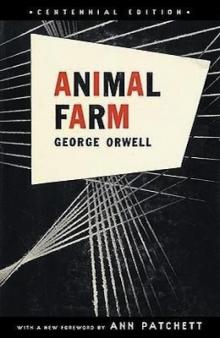 Animal Farm & 1984
Animal Farm & 1984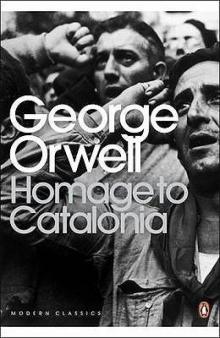 Homage to Catalonia
Homage to Catalonia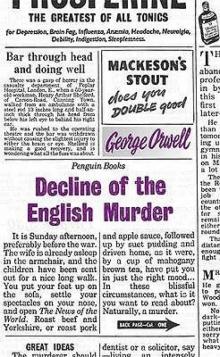 Decline of the English Murder
Decline of the English Murder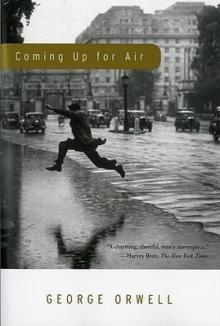 Coming Up for Air
Coming Up for Air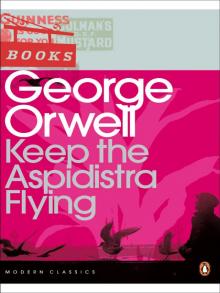 Keep the Aspidistra Flying
Keep the Aspidistra Flying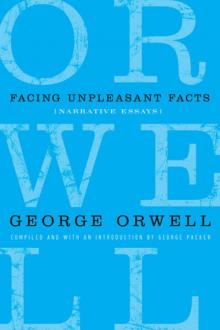 Facing Unpleasant Facts: Narrative Essays
Facing Unpleasant Facts: Narrative Essays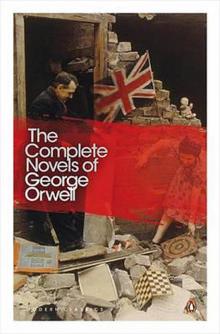 The Complete Novels of George Orwell
The Complete Novels of George Orwell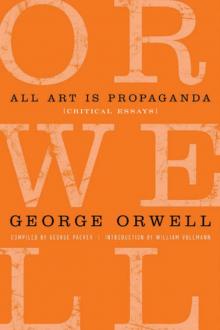 All Art Is Propaganda: Critical Essays
All Art Is Propaganda: Critical Essays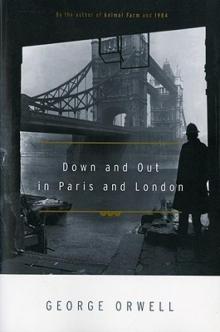 Down and Out in Paris and London
Down and Out in Paris and London Why I Write
Why I Write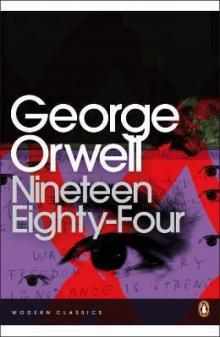 Nineteen Eighty-Four
Nineteen Eighty-Four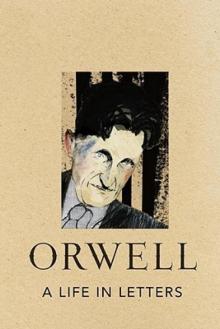 A Life in Letters
A Life in Letters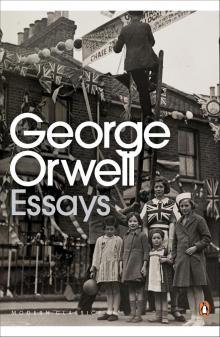 Essays
Essays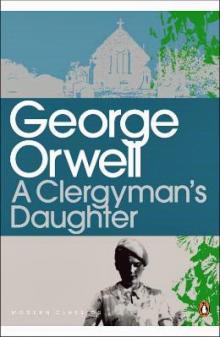 A Clergyman's Daughter
A Clergyman's Daughter Fifty Orwell Essays
Fifty Orwell Essays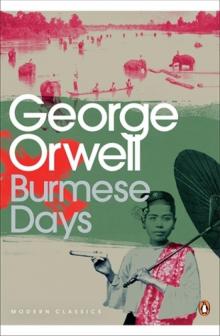 Burmese Days
Burmese Days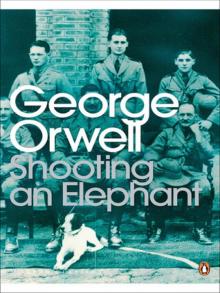 Shooting an Elephant
Shooting an Elephant 1984 (Penguin)
1984 (Penguin)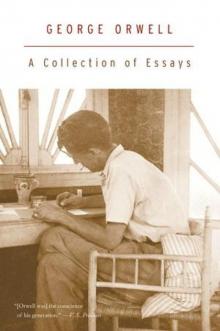 A Collection of Essays
A Collection of Essays 1984
1984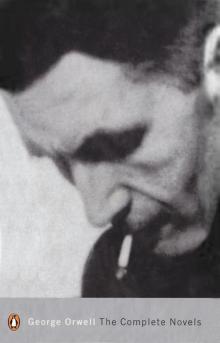 The Complete Novels
The Complete Novels All Art Is Propaganda
All Art Is Propaganda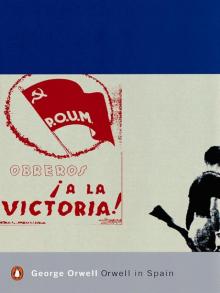 Orwell in Spain
Orwell in Spain Animal Farm: A Fairy Story
Animal Farm: A Fairy Story Animal Farm and 1984
Animal Farm and 1984